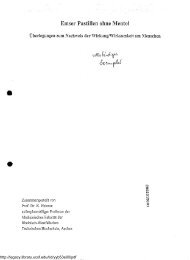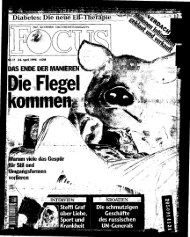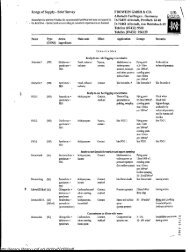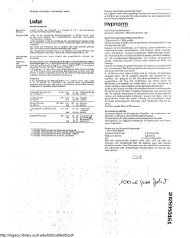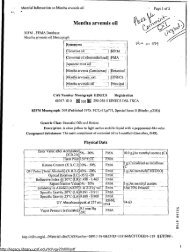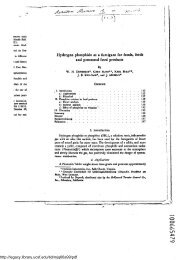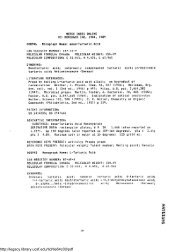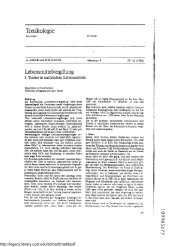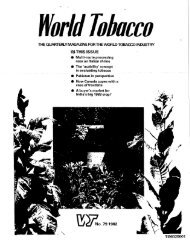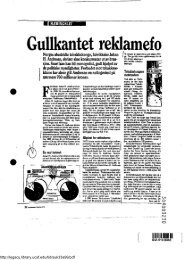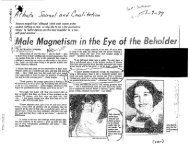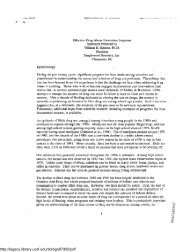How business, doctors and journalists prey on your food anxieties I
How business, doctors and journalists prey on your food anxieties I
How business, doctors and journalists prey on your food anxieties I
Create successful ePaper yourself
Turn your PDF publications into a flip-book with our unique Google optimized e-Paper software.
Hcalth scare<br />
I<br />
Expect more such n<strong>on</strong>sense,<br />
because of the inherent<br />
limitari<strong>on</strong>s in the<br />
cpidemiologv of n<strong>on</strong>infectious<br />
disease . Scientists<br />
could desise an expcriment<br />
that would realk<br />
proNe whethcr loodoses<br />
of sec<strong>on</strong>dh<str<strong>on</strong>g>and</str<strong>on</strong>g> smoke<br />
hurt children, but the experimentwould<br />
be unethical<br />
. To really I:now<br />
whether exercise makes<br />
people live l<strong>on</strong>ger, c .pcrimenters<br />
would have to<br />
r<str<strong>on</strong>g>and</str<strong>on</strong>g>omly select 1,000<br />
subjects <str<strong>on</strong>g>and</str<strong>on</strong>g> regiment<br />
their evero waking moment<br />
for decades .<br />
In default of such serious<br />
studies, distrust most<br />
sweeping c<strong>on</strong>clusi<strong>on</strong>s<br />
linking diet <str<strong>on</strong>g>and</str<strong>on</strong>g> health .<br />
Yes, cou can proN e statisticallv<br />
that people who esercise Gve l<strong>on</strong>ger . But the corv.dusi<strong>on</strong>-that<br />
exercise is good for you-mav put tJte cart<br />
before the horse . Think about it . Are people healdty<br />
because tluv esercisei Or do thev exercise because they arc<br />
healthv? The barc correlati<strong>on</strong> proves nothing . Pltysiological<br />
<str<strong>on</strong>g>and</str<strong>on</strong>g> other e\ ;dence leads mariv <str<strong>on</strong>g>doctors</str<strong>on</strong>g> to c<strong>on</strong>clude<br />
exercise helps . But even here, there's no clear proof<br />
The mass media punev health scare stories breath-<br />
!ess[v, treating each new paper in isolati<strong>on</strong> t}om the <strong>on</strong>es<br />
that came betixe . E%en if the researchers c<strong>on</strong>cede that<br />
there are limitati<strong>on</strong>s to the validity of the study, the media<br />
usuallv bury the caveat . "You reporters take at face value<br />
eVerything the scientists tell vou-something y'ou would<br />
ne~er think of doing if the<br />
source «-ere industrv<br />
or the government,"<br />
grouses <strong>on</strong>e prominent<br />
cpidemiologist .<br />
There's too much at<br />
stake for the health scare<br />
industry to admit to the<br />
shortcomings ofepidemiology<br />
. The Berkeley, Har-<br />
% ard, Johns Hopkins,<br />
Tutis <str<strong>on</strong>g>and</str<strong>on</strong>g> L'niversit • of<br />
Texas medical schools are<br />
raising m<strong>on</strong>ev by publishing<br />
health tip nct%,slettcrs<br />
for the general puhlic-<br />
The Journal of the American<br />
Medical Associati<strong>on</strong><br />
takes in S1, milli<strong>on</strong> in<br />
adsetZising a aenr . Jane<br />
Br ndv's Good Fod Book :<br />
Lirialt the HiAh Crtr6oht .-<br />
drnte SVav( 1985 ) is in its<br />
tenth printing . Sales of<br />
preparcd fr>ods ntaking<br />
health claims ("lo%c-tat,"<br />
"no sugar added," '9o r<br />
sodium") account ;or<br />
S23 billi<strong>on</strong> a vear .<br />
Let's go back to the<br />
butter/margarine argumcnt.<br />
In 1993 a group at<br />
Harvard linked trans-fatty<br />
acids to heart disease,<br />
adding, a year latcr, that<br />
the synthetic fats may be<br />
resp<strong>on</strong>sible for an estra<br />
30,000 deaths a vear in<br />
the U .S . Margarine, of<br />
course, is fu':l of regetable<br />
oil hardened by a process<br />
called hydrogemati<strong>on</strong>tishich<br />
produces trans-fat-<br />
R, acids . The next year,<br />
murgarine sales dropped<br />
8 .2% by volumc, <str<strong>on</strong>g>and</str<strong>on</strong>g> butter<br />
sales rose 1-4% .<br />
Take eggs. "You'd<br />
think there were half a dozen studies saring to avoid eggs ; "<br />
sa~s Walter C Willett of the Han, ard School oF Public<br />
Health . "Guess how manv there n°erc? When we started<br />
looking at this questi<strong>on</strong>, zero . Now there's still ven little<br />
informati<strong>on</strong> . No <strong>on</strong>e's cven slto~~n it in ut observati<strong>on</strong>al<br />
study [<strong>on</strong>e where eou compare people who say they cat<br />
eggs with people who sac they d<strong>on</strong>'t] . The recommendati<strong>on</strong><br />
was based <strong>on</strong>ly <strong>on</strong> reas<strong>on</strong>ing that cholesterol in diet<br />
affects blood cholesterol, <str<strong>on</strong>g>and</str<strong>on</strong>g> that eggs havc cholesterol ."<br />
Tell that to the chicken farmers . Thcr've watched dtolesterol-spooked<br />
c<strong>on</strong>sumers cut their egg c<strong>on</strong>sumpti<strong>on</strong> from<br />
a pc-ik of 402 eggs per capita in 1945 to 238 todac .<br />
The old eggs-are-bad theory was built <strong>on</strong> a pretty sseak<br />
c<strong>on</strong>necti<strong>on</strong>, that cholesterol<br />
in <strong>food</strong>s affects<br />
blood cholesterol . But the<br />
fact is that gcnctic ntakeup<br />
is far more important<br />
than c<strong>on</strong>sumpti<strong>on</strong> ofcholesterol<br />
in determining<br />
blood cholesterol Ieels .<br />
Mavncltile, milli<strong>on</strong>s of<br />
children who could benetit<br />
from the cheap protein<br />
in eggs are being shooed<br />
awav tr<strong>on</strong>i it .<br />
Then there's the outrageous<br />
canipaign against<br />
"passivc" smoking . Some<br />
stndies 11,10 e purported to<br />
show that people exposed<br />
to other pcoplc's smokc<br />
arc more pr<strong>on</strong>e to lung<br />
caneer than the general<br />
populati<strong>on</strong> . The statistics<br />
are dubious . So-called<br />
passi~e smokers often<br />
1?2<br />
Porues . Au,ua 14 . 1995<br />
http://legacy.library.ucsf.edu/tid/agf97d00/pdf



